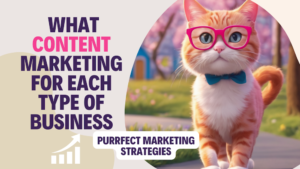Content marketing strategies can vary based on your website’s offering, whether you’re selling products, services, providing informational content or generating leads. So, what content marketing you should do depending on the business model of your website?
If you are still unsure of what content marketing is or why you should do it for your website, have a read at the article in the link.
The next step would be to create a content marketing strategy. This article provides insights into creating a comprehensive content marketing strategy for websites, emphasising the importance of understanding target audiences, defining content types, choosing distribution channels, and striking a balance between paid and organic content, while also addressing the challenges and objectives of content marketing.
Once you´ve got your plan, I would suggest that before you get to the nitty gritty you plan your content in advance by using a content marketing template.
Finally, it is important to think about the SEO to apply to your content. There are differences between SEO for transactional (eCommerce or services) versus informational sites and how to do content and SEO for B2B and B2C.
In today’s article we look at the purpose of your website from a content perspective. We won’t touch on how to optimise your website for ranking depending on if you sell products or services, but on what type of content you should do.
What content marketing you should do depending on the business model of your website.
1. Content to write for Product-Selling Websites:
– Product Descriptions: Create detailed and persuasive product descriptions to highlight features, benefits, and unique selling points of your products. Use high-quality images and videos to showcase products.
– Customer Reviews and Testimonials: Encourage and display customer reviews and testimonials to build trust and social proof. Include both positive and constructive feedback.
– How-To Guides and Tutorials: Develop content that guides customers on using your products effectively, provides maintenance tips, or showcases creative ways to use them.
– Comparison Guides: Create content that compares your products with similar products in the market, helping customers make informed decisions.
– Promotions and Discounts: Announce and promote special offers, discounts, and sales through various content types, including blog posts, social media posts, and email marketing.
– Video Demonstrations: Produce product demonstration videos to show how products work, their benefits, and customer experiences.
– User-Generated Content: Encourage customers to share their experiences with your products on social media, using specific hashtags or sharing their content on your website.
2. Content to write for Service-Selling Websites:
– Service Pages: Create detailed service pages that describe the services you offer, including pricing, benefits, and client testimonials.
– Case Studies: Showcase real-life examples of how your services have helped clients or businesses, demonstrating your expertise and problem-solving ability.
– FAQs and Knowledge Base: Develop content that answers common questions about your services, helps customers understand the process, and addresses concerns.
– Service Portfolios: Showcase your past work, projects, or clients to illustrate the quality and diversity of your services.
– Consultation and Booking Forms: Include calls to action and forms that allow potential clients to schedule consultations or book your services directly.
– Webinars and Live Demos: Host webinars or live demonstrations of your services to educate potential clients and address their questions in real-time.
3. Content to write for Informational Websites:
– Blog Posts and Articles: Produce high-quality, informative content that educates and engages your target audience. Topics should be relevant to your niche or industry.
– Guides and Ebooks: Create in-depth guides and ebooks on topics that your audience is interested in. Offer them as free resources or as lead magnets for email list building.
– Infographics and Visual Content: Present data and complex information in a visually appealing format, making it easier for readers to digest.
– How-To Guides and Tutorials: Provide step-by-step instructions on various topics to help your audience solve problems or acquire new skills.
– Podcasts and Interviews: Share audio content, including interviews with experts in your industry or discussions of relevant topics.
– Whitepapers and Research Reports: Publish authoritative and data-driven reports that establish your credibility in your field.
– News and Industry Updates: Stay updated on industry news and provide timely information to your audience to position yourself as an industry authority.
4. Content to write for Lead Generation Websites:
– Lead Magnets: Develop high-converting lead magnets, such as ebooks, templates, checklists, or free trials, to capture visitor information and generate leads.
– Landing Pages: Create dedicated landing pages with compelling offers to encourage visitors to share their contact details in exchange for valuable content or services.
– Email Marketing: Use email marketing to nurture and convert leads into customers. Send targeted content and offers to your subscribers.
– Content marketing for lead generation websites should focus on attracting, engaging, and capturing potential leads by providing content that addresses their needs and pain points. Lead magnets and email marketing play a vital role in this process.
Here are other content related articles that you might find useful:
Does having multiple categories in WordPress affect SEO?
What is programmatic SEO and how to use it to boost your marketing efforts.
How to use Chat GPT to write marketing content and AI prompt examples.
Boost Your Content Marketing Strategy with Content Marketing Templates
How to Create a Content Marketing Strategy
Programmatic SEO with ChatGPT: A Real Case Study that Boosted Rankings
How to Advertise Financing for High-Ticket Products: A Step-by-Step Finance Campaign Strategy
How to do SEO and Content for B2B vs B2C Selling Propositions: A Comprehensive Guide.
Remember that regardless of the purpose of your website, content marketing should aim to provide value to your audience, build trust, and ultimately drive conversions or other desired actions. Tailor your content marketing strategy to align with your specific goals and target audience, and be consistent in delivering valuable, relevant content.
Keep your claws sharp and your marketing instincts keen, until we meet again in the next post!
Moxie

